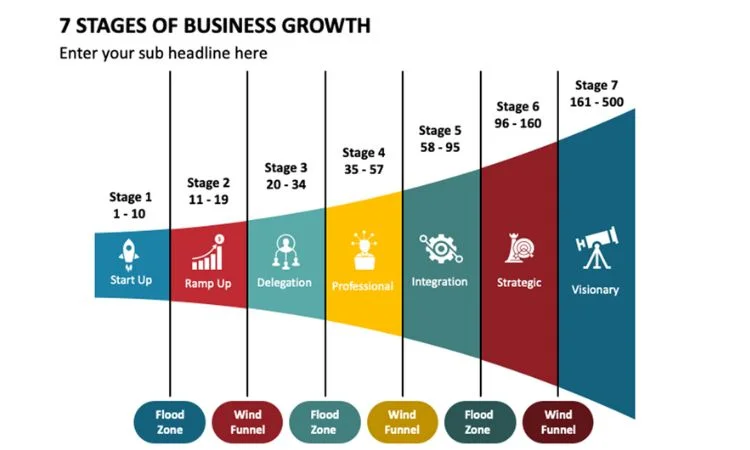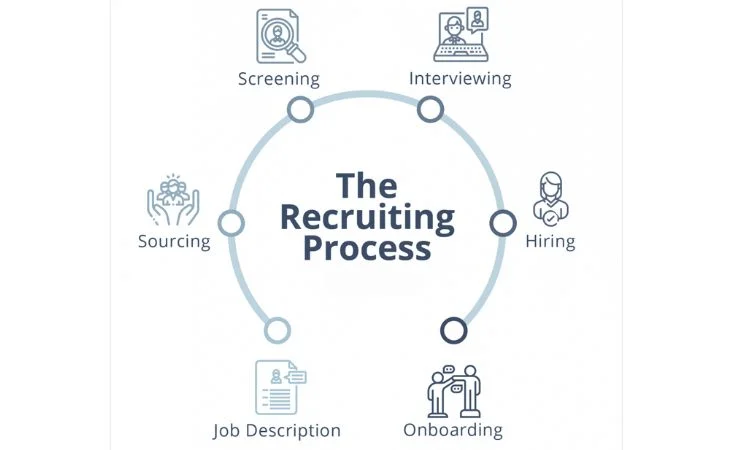The process of running a startup and successfully scaling it presents a formidable challenge. It is particularly demanding when it comes to the critical task of recruiting employees for your burgeoning enterprise. To ensure the optimal alignment of individuals with the roles and overall mission of your company, sourcing and attracting the right candidates is paramount.

As your startup progresses through various stages of growth, it becomes increasingly essential to establish a robust and well-defined hiring process. This strategic planning is crucial for seamless transitions and effective team expansion. Furthermore, identifying and implementing appropriate tools and software can alleviate the burdens associated with the hiring process, enhancing efficiency and accuracy.
It is important to recognize that the ability to recruit the right talent and assemble high-performing teams is a determining factor in the success or failure of many startups. With this in mind, be rest assured that we are well-equipped to assist you in navigating the complexities of this crucial aspect of your entrepreneurial journey.
The Significance of Strategic Hiring for Startups

Among the primary factors contributing to the failure of startups, the scarcity of exceptional talent in both recruitment and management stands out prominently. Without the right talent, even the most promising ideas can falter or remain stagnant. Before delving into the question of “How to effectively recruit employees for a startup,” it is imperative to understand why securing the right candidates for your startup is of paramount importance.
- Establishing a Solid Foundation: The initial cohort of team members you bring on board will play a pivotal role in executing your vision, delivering your product or service to the market, acquiring customers, fostering innovation, and driving revenue growth. Their contributions set the trajectory for your startup’s success.
- Shaping Organizational Culture: The selection of the right candidates not only defines the skill set within your workforce but also profoundly influences the cultural fabric of your organization. They set the tone for values, work ethic, and team dynamics, ultimately shaping the culture that permeates your startup.
- Facilitating Scaling: The journey of a startup often involves transitioning from one growth stage to another. This progression demands a workforce capable of adaptability and resilience. Only by employing individuals who possess the requisite skills and mindset can a startup successfully navigate the challenges associated with growth and expansion.
- Team Building and Vertical Development: Your initial hires serve as the cornerstone upon which you build teams and verticals within your startup. They are instrumental in forming the nucleus of specialized talent that will drive various aspects of your business. The right candidates not only excel in their roles but also contribute to the formation of high-performing teams.
The Top Effective Ways
1.Evaluation Of Your Hiring Requirements:
To effectively address your hiring needs and build a strong foundation for your startup’s growth, it is essential to embark on a systematic evaluation of your hiring requirements. This process involves careful consideration of the following critical elements:
- Organizational Mission and Vision: Begin by revisiting your startup’s core mission and long-term vision. Understanding your company’s purpose and future direction is paramount in aligning your hiring strategy with the overarching goals of the organization.
- Stage of Growth: Assess the current stage of growth your startup occupies within the market. It is imperative to recognize whether you are in the early startup phase, experiencing rapid expansion, or navigating the challenges of scaling. Your hiring strategy should be tailored to suit the specific growth stage you find yourself in.

- Short-Term and Mid-Term Goals: Clearly outline your short-term and mid-term business goals and objectives, ensuring they are aligned with the long-term aspirations of your company. Identifying these milestones will guide your recruitment efforts and contribute to achieving sustained growth.
- Current Employees and Roles: Evaluate your existing workforce, their roles, and responsibilities. Understanding the strengths and weaknesses of your current team is vital for identifying the expertise and skills that are lacking within your organization.
Having diligently gathered this information, proceed to map your findings to determine the talent gaps within your startup. Create a comprehensive plan for the next year or so, quantifying the number of individuals required in various functional areas and specific roles. For each position earmarked for recruitment, provide a detailed rationale that outlines why hiring a candidate for that role is imperative to the success of your company.
This meticulous approach to identifying your hiring requirements will serve as the bedrock for a strategic and purposeful recruitment process, ensuring that you secure the right talent to drive your startup toward its envisioned success.
The evolution of your startup from one growth stage to the next necessitates a well-defined hiring process and a comprehensive plan. It becomes paramount to discover the appropriate tools and software solutions that can alleviate the burdens associated with the employing process. It is worth noting that numerous startups have met their demise due to the inability to assemble the right teams, underscoring the significance of this undertaking. Rest assured, we are here to provide guidance and support in this regard.
In order to effectively manage the hiring task , it is advisable to cautiously review the list of positions that need to be filled, with multiple iterations to ensure that the projected requirements are accurately aligned with your startup’s goals. Additionally, consider the feasibility of engaging temporary resources, such as freelancers or consultants, to fulfill specific roles, thereby enhancing operational flexibility.
Furthermore, it is prudent to explore available tools and software applications that can streamline certain tasks, thus enabling your employees to take on additional responsibilities. In the event that such tools are not readily available, it may be judicious to consider capping the number of candidates to be hired, ensuring a more manageable and structured recruitment procedure .
2. Decide On A Hiring Budget
Establishing a well-defined hiring budget is a crucial step in the strategic administration of your startup’s human resources. Recognizing the challenges inherent in operating a startup with limited financial resources, particularly when confronted with the imperative to expand your workforce, necessitates a comprehensive evaluation of various financial considerations.
To this end, it is prudent to collaborate closely with your team members and seek the insights of industry peers in order to ascertain and allocate budgetary resources effectively.
The budget should encompass several key components, including but not limited to:
- Job Advertising Costs: Anticipating expenses related to advertising job vacancies, be it on online job boards or through other promotional channels, is imperative for your financial planning.
- In-house Recruiter Salaries: Should your startup employ in-house recruiters, allocating funds for their salaries and related expenditures is essential to sustain a robust recruitment effort.
- Recruitment Agency Fees: In the event that you choose to enlist the services of recruitment agencies, understanding and factoring in their fees is vital in crafting an accurate budget.
- Development of a Company Website with a Dedicated Career Site: Constructing and maintaining a company website featuring a dedicated career portal is an investment that fosters long-term recruitment efforts. Be sure to allocate the necessary budgetary resources for this purpose.
- Assessments (if Procured from External Sources): If your hiring process includes external assessments or evaluations, the costs associated with these tools should be taken into account within your economic framework.
3. Hire candidates with these kinds of Qualities.
When it comes to hiring candidates for your startup, it is imperative to identify and select individuals who possess the following attributes, tailored to your specific growth stage:
For Early-Stage Startups:
- Generalists: Seek individuals who exhibit versatility and adaptability. Early-stage startups often require team members who can wear multiple hats and handle diverse responsibilities.
- Tenacity: Building a startup can be an arduous journey. Therefore, it is essential to enroll individuals who demonstrate resilience, persistence, and a willingness to overcome challenges.
- Passion for the Startup: Look for candidates who share a genuine enthusiasm for your startup’s mission, goals, and vision. A shared sense of purpose can be a powerful driving force.
- Proactive Go-Getters: Prioritize candidates who are proactive in taking the initiative and have a strong drive to make a meaningful impact on the company’s success.
- Ownership and Accountability: Choose individuals who are not hesitant to take ownership of their tasks and responsibilities, as well as be accountable for their actions and outcomes.
- Growth Mindset: A growth mindset is crucial in an early-stage startup. Seek team members who are open to learning, adapting, and continuously improving.
For Growth-Stage Startups:
While the aforementioned qualities remain relevant, there are additional attributes to consider for growth-stage startups:
- Specialists: Look for individuals who have specialized skills and expertise in areas that can contribute to scaling your startup. Previous experience in a similar role is a valuable asset.
- Scalability: Prioritize candidates with the proven ability to scale a startup. Their experience in managing growth is a significant advantage.
- Adaptability: Given the potential for rapid changes in a growing organization, employ individuals who can quickly adapt to evolving circumstances and navigate multiple challenges effectively.
- Strategic Contributors: Seek candidates who can actively contribute to expanding your startup’s vision and objectives. They should align with your long-term goals and mission.
- Brand and Culture Ambassadors: Hire candidates who not only fit the skills and expertise requirements but also embody and promote your startup’s brand and culture.
- Attitude Over Skills: Place greater emphasis on an applicant’s attitude and mindset over their specific skills or experience. A positive attitude, a willingness to learn, and a strong work ethic can drive success.
- Potential and Growth: Consider contenders who may lack prior experience in a particular role but display potential and a commitment to personal growth. Give them the opportunity to develop within your organization.
Remember that the hiring process is a critical aspect of building a successful startup. By carefully evaluating aspirants based on these criteria, you can significantly enhance your chances of assembling a talented and motivated team that aligns with your startup’s stage and objectives.
4.Identifying Optimal Candidate Sourcing Strategies
When embarking on the journey of building and scaling a startup, assembling the right team is an imperative task. Finding the ideal candidates to fit your organizational needs can be a complex and demanding endeavor, and it requires a strategic approach. In this pursuit, we present a range of effective channels to source potential contestants who associate with your startup’s vision and objectives.

1. Leveraging Your Current Workforce: Your existing employees are not just contributors; they are also stakeholders in your startup’s success. Tap into their network and connections by encouraging them to refer friends and former colleagues who possess the requisite skills and experience to contribute meaningfully to your venture.
2. Engaging with the Startup Community: Networking within the startup ecosystem is pivotal. Connect with fellow founders and individuals with startup experience to discuss your staffing needs. Building relationships within the startup community can yield valuable insights and potential candidate referrals that align with your requirements.
3. Harnessing the Power of Social Media: In today’s digital age, social media platforms offer a wealth of information on potential candidates. Spend time perusing profiles and evaluating candidates’ past work and experiences. Reach out to those who exhibit promise, introducing them to your available positions via direct messages.
4. Collaborating with Recruitment Agencies: The task of hiring can be overwhelming, especially for those new to the process. Engaging a reputable recruitment agency can alleviate this burden. Ensure that you thoroughly evaluate the credentials and reputation of any agency you choose to collaborate with, as their expertise can significantly impact the quality of your hires.
5. Leveraging Job Boards: Utilizing job boards tailored to your industry and specific roles is a fundamental approach to attracting job-seekers . Select job boards that collaborate with your hiring needs and promote your vacancies strategically to engage with a pool of talent that matches your requirements.
By adopting a methodical approach and drawing upon these sourcing strategies, your startup can navigate the intricate task of hiring employees effectively, ensuring a cohesive and proficient team. This critical step is instrumental in realizing your startup’s potential and fostering its growth.
Conclusion
Hiring individuals is the foundational and foremost step for any start up toward its growth. From selecting the right talent to employing apt strategies in the recruitment process – are the key contributors to progress and continual escalation of the enterprise. Therefore, by involving a systematic and tactical approach to deal with the exigent procedure of hiring a capable and ingenious workforce, any burgeoning startup can achieve what it envisions.















